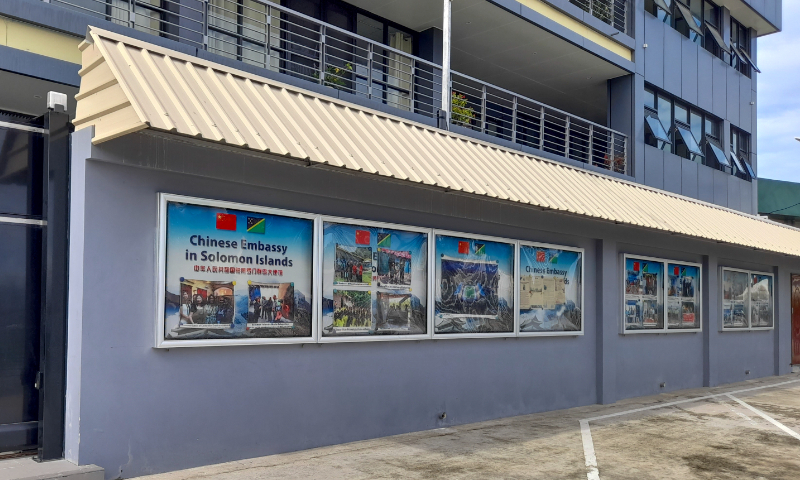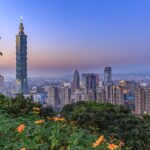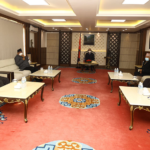A regular security pact signed to meet the actual needs of both parties between China and the Solomon Islands has recently become a sore spot for the US and its allies Australia, and others who ardently continue to hype the narrative of China as a “potential threat” in the South Pacific region which they have long considered as their own “backyard.”
The Solomon Islands have become yet another pawn in the geopolitical war waged by the US and its allies to antagonize and corner China in South Pacific, whenever Beijing takes a step toward advancing on cooperation and exchanges with South Pacific island nations, whether it be Fiji, Kiribati or the Solomon Islands.
Generating rumors designed to smear China, creating an anti-China atmosphere and supporting opposition parties to rally allies for a possible military escalation, are some of the means that the US, Australia and their allies are accustomed to using to erode the presence of China in the Southern Pacific, observers noted.
China hopes to maintain normal communications with all island nations but the US and Australia much favor the use of bloc politics and a Cold War mentality towards the region, which could lead to a disruption in regional stability, analysts said. Fortunately, though such attempts may have swayed a few in the targeted island nations, people have grown increasingly aware of the benefits of developing stronger relations with China, as peace and development are what they truly want.
A new battlefield
In the eyes of the US, Australia and their Western allies, the South Pacific region has become a new “battleground” to counter China as they employ several tactics to hinder China’s geopolitical interests.
China and the Solomon Islands inked a bilateral security cooperation framework agreement on March 30, the Chinese Foreign Ministry confirmed the next day.
Although both China and the Solomon Islands have denied rumors of an alleged plan to establish a military base, some Western media still ran with the allegation, disregarding facts. Some media reports even insinuated that the security pact will “permit Beijing enormous inroads into the Solomon Islands.”
This dog and pony show is not unfamiliar. Using the media to influence public opinion and create an unfavorable political atmosphere is a frequent means by which the US and its allies disparage China’s existence and involvement in the Southern Pacific region.
In 2021, a Kiribati government official told Reuters that China was planning on upgrading an airport runway on a coral reef island along with other infrastructure developments like bridges to benefit residents. However, some who opposed such a move worried that China might use the project as a Trojan horse with “military intentions,” BBC reported.
The BBC also claimed that building facilities on the Kiribati island of Kanton “will provide a foothold there for China.”
Similar reports also appeared on related Chinese-led projects in Fiji, Vanuatu, and Samoa.
“The English-speaking countries use their advantage of language as a tool of public opinion,” Li Haidong, a professor at the China Foreign Affairs University, told the Global Times on Friday. “To any of China’s normal exchanges with these island nations, the US and their allies seek ways to smear China, fabricate rumors and spread them to deface the image and influence of China in the Southern Pacific or around the world.”
Yang Honglian, senior researcher of the Pacific Islands Research Center at the Liaocheng University in Fiji, concluded that many such claims encompass fears that “China is setting debt traps in island nations,” “China is to apply neocolonialism in the region,” and “China would develop military forces there.”
“In some small news pieces related to China, they are able to maintain objectivity, but on major international affairs, Western media whips up a frenzy of fears surrounding China. This is actually a strategy created by them,” Yang noted, adding that, “however, most of the islanders have already come to rely on Western media sources, so on such accusations against China, they often tend to believe Western media too.”
In response to the security pact, Australian Minister for International Development and the Pacific, Zed Seselja, made a “rare” visit to the Solomon Islands on Tuesday during which he urged the island country to renege on the deal with China.
On Sunday, the Australian foreign minister vowed that the country would not end its security treaty with the Solomon Islands.
Military preparations among allies targeting China have become another tool in the targeted offensive against China in the South Pacific, observers noted.
“Australia believes that next, China is bound to develop a military relationship with these island nations,” Yang mentioned. “So, Australia is bound to strengthen its influence on the countries and increase the deployment and construction of military bases.”
In September 2021, when Australia, the UK and the US announced the establishment of the military partnership AUKUS, one of its main purposes was to help Australia build a nuclear submarine force to contribute to the new Indo-Pacific strategic cooperation, the BBC reported.
Ross Babbage, former Australian defense official, said that Australia’s acquisition of advanced submarines with the help of its AUKUS allies was to allow Australia’s submarine force to compete with Chinese submarines in the future, according to a BBC report.
The game under the table
Apart from smearing campaigns, levied threats and spreading misinformation, in their efforts to counter China, Australia and the US have been doing more, including supporting opposition of China-friendly governments and lobbying elites in the islands.
The riots that took place in the Solomon Islands’ capital, Honiara, in November 2021 saw many Chinese nationals suffer heavy losses in the city, most of whom are retailers, as their shops were vandalized and looted and their personal safety put in jeopardy.
In the 2021 revolts, several media outlets reported that the rioters were from the island of Malaita, the Solomon Island’s most populous province which is under the leadership of Daniel Suidani, a longtime opponent of the central government located in Guadalcanal. Additionally, Malaita’s collusion with the island of Taiwan is far from a secret.
The political and security headaches in the Solomon Islands since 2019 have been to a large extent the direct result of the China-US power competition as underlined by Australia’s Pacific Step-up policy and the US’ Indo-Pacific Strategy, George Balau, a Solomon Islands scholar, said.
It is an open secret that Australian and American agents in the national opposition and Malaita Provincial Government attempted the failed civilian coup of November 2021, to oust PM Sogavare and his government which capitalized on local political fault-lines but focused squarely on anti-China posturing, according to Balau.
Since China and the Solomon Islands established diplomatic relations in September 2019, the US immediately rescinded its offer of financial aid to the island of Malaita. Moreover, Australia has been closely cooperating with the US amid the turmoil, experts said.
There are many “routines” in traditional aid methods employed by the US and Australia, but island nations sometimes cannot fully access benefits as promised, analysts said.
“In fact, it is difficult for the people of island nations to directly benefit from this kind of assistance. Only a small number of people who are valued or are carefully selected by the US and Australia will receive direct benefits,” Yang noted.
Moreover, Western countries have been trying to impose their political stance on elites in the island nations. “The US and Australia are trying to form a political consensus on the alleged threat posed by China to the South Pacific region and among their allies, and this consensus is not just at the level of public opinion but must rise to the level of politics,” Li said. They would like to promote a “China is not popular” consensus among the elites who could influence policymaking. “Such a process will not stop,” Li said.
‘In fear of their own shadow’
In the issues related to the South Pacific region, some people often note that the US is the “master,” Australia is the “housekeeper” and Pacific island nations are regarded as the “backyard” that the “master” authorizes the “housekeeper” to manage.
Since World War II, things in the region have seemingly been run like this. However, experts noted that the environment in the Pacific has been changing. For instance, the Solomon Islands follow a foreign policy motto of “Friends to all and enemies to none.”
“The US can no longer rely on our shared WWII history with the Solomon Islands as a way to counter China’s influence. This approach has failed,” read an article by Eileen Natuzzi published on Thursday on the Diplomat, noting that the US should “speak directly to the 686,878 people living in the Solomon Islands, for it is the people who will determine their country’s future.”
“The US and Australia believe whoever wants to communicate with the islands or enter the region should have their permission first. This is a typical bullying tactic, showing a sense of superiority by these Western countries and races,” Li noted adding that “the reaction of Western countries to the China-Solomon Islands security pact is a typical zero-sum game and Cold War mentality. It is extremely wrong and a vilified interpretation of China’s normal exchanges in the Southern Pacific region, which is ridiculous and untenable.”
In the island nations, more people are coming to understand the truth of what is happening.
“The core of the Pacific philosophy is sharing and tolerance and the islanders are willing to accept foreign cultures. As long as they respect the local people they will be welcomed,” and” the attempts by the US and Australia to use island nations to contain China, dragging the countries into a back-and-forth situation, have raised concerns among some people.”
Though locals in the islands might be misled by some Western voices smearing China, a group of elites in these island nations who have really seen the world and have a greater perspective have a very clear view of Western colonialism and understand that China’s assistance to island nations is a real “friendship without intentions,” Yang said.
“The people of island nations are reluctant to conform. They love peace. They hope to live in peace with the rest of the world. This is the life they yearn for,” Yang said.
“Historical facts strongly back the Solomon Islands’ government and China’s position. For instance, China has no history of fighting foreign wars or maintaining foreign military outposts. The US does, and repeatedly!” Balau said, remarking that ” it is not unreasonable to suggest that the US and Australia are probably just afraid of their own shadow and past.”
The Chinese Embassy is seen in Honiara, Solomon Islands, on April 2, 2022. Photo: VCG




